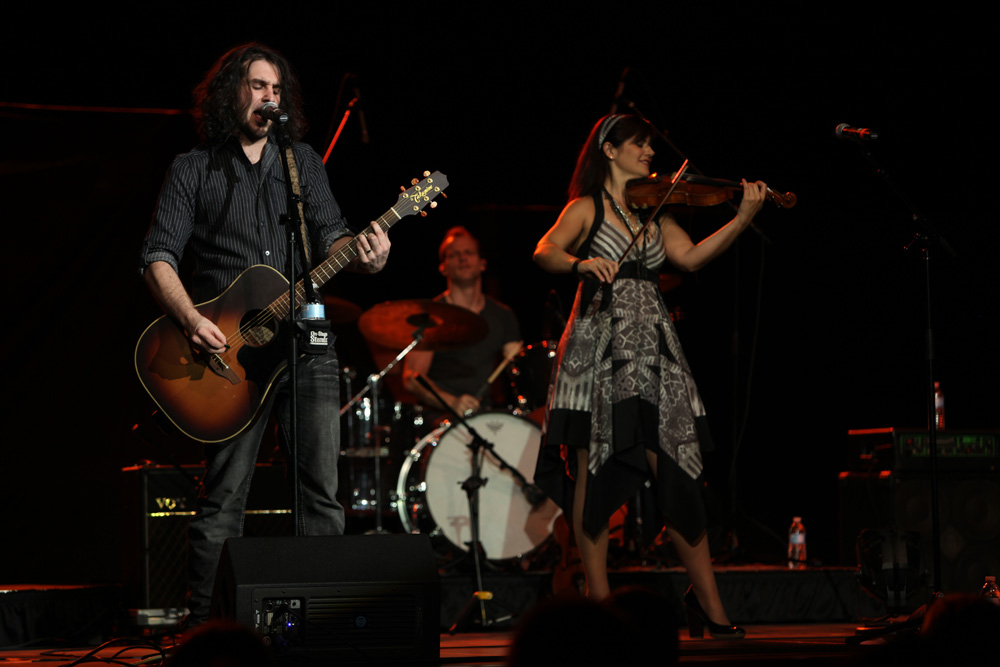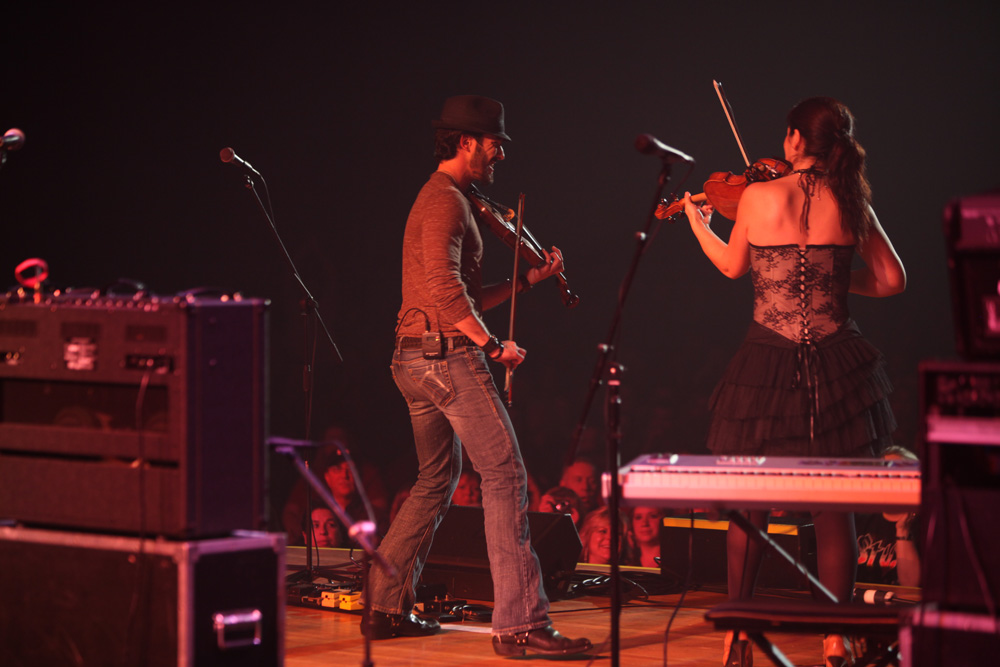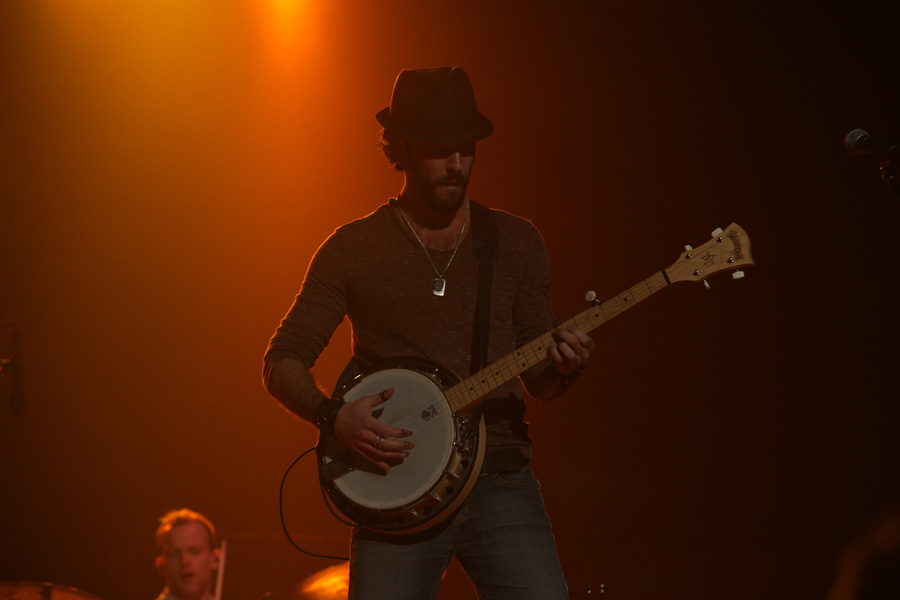Interview: Connor Christian and Jeff Spirko on the Sounds of Southern Gothic

Equal parts hard rock and country, with elements of blues, Connor Christian & Southern Gothic are building their success via old-school methodology: gig, gig and gig.
They’ve followed the D.I.Y. route from the start, recording independently and booking their own shows, building their fan base step by step as they outreach on the road and through social media.
The band’s latest release, New Hometown (Part 2), is a nine-song collection of new material and a continuation of the CCSG musical journey, with all members contributing vocals, and three of them trading guitar, fiddle, mandolin, banjo and keyboard parts. The fiddle also plays a prominent role in their sound, often taking a front seat alongside the guitar or helping to shape the guitar parts.
Connor Christian and Southern Gothic is Connor Christian: vocals, guitar, keyboard, harmonica; Joe Abramson: bass, vocals; Shawn Thacker: drums, vocals; Jeff Spirko: guitar, fiddle, banjo, piano, mandolin, vocals; and Elena Martin: fiddle, keyboard, mandolin, vocals.
Spirko grew up in New York and began studying classical violin when he was 3. He made All-State, started playing piano in middle school, added guitar and mandolin in high school and later took up the banjo. Christian played his first club gig at age 12 at an all-ages venue in Atlanta, left home at 14, ended up in Philadelphia, eventually moved back to Atlanta, joined a rap band, went the solo route and began laying the foundation of a band that would become Southern Gothic.
Diverse backgrounds, different styles, unique influences — somehow it all works. Christian and Spirko explain.
Was it difficult to find musicians who understood what you were trying to do with Southern Gothic?
Get The Pick Newsletter
All the latest guitar news, interviews, lessons, reviews, deals and more, direct to your inbox!
CHRISTIAN: Shawn and Joe have been with me since 2004. We went through a series of different guitar players and fiddle players and never quite found the right fit. Jeff was recommended by a couple of people and he did fill-in gigs for us. He had a band that he was invested in and he was writing all the songs. After a year or so, we gave up on trying to get him to join. We put out an ad for fiddle payers and landed on Elena, and the second we got her, Jeff was like, “What about me?” “We offered you the job a hundred times!”
One day Elena couldn’t make a gig and Jeff stepped in, and a couple of weeks later we did a show where his band opened for us and we had him come up and do a few songs. Two or three days later, we talked about moving him into a musical director kind of role. I wanted to bring him in to play everything and run rehearsals when I’m not there. Once Jeff joined the band, it got crazy. We’d go to a city with the new five-piece lineup and there’d be 50 people, then the next time 80, 120 — it climbed exponentially every time we’d go back to a city. That lineup was speaking to people. The bigger gigs started coming through within a year, and the real turning point was signing with Red Light Management.
At what point did this lineup become permanent?
SPIRKO: The band I was in when I met Connor was having a tough time coming together, but I wanted to stick with it. I was playing with Connor on weekends and spending my time during the week being involved with this band. Connor’s band had been together for five years at that point and they had done so much of the hard work and paid their dues. I was paying my dues in a different way, but I was impressed with how much Connor was playing consistently and out of town. I joined a couple of months after Elena, and then we had to rethink because I was just the violin player when I was filling in. Now Elena was the fiddle player, and I play all these other instruments, so we had a lot of options and materials to paint with.
With so many multi-instrumentalists in the band, how do you delegate the tracking process, and does that change onstage?
CHRISTIAN: It’s whoever can play that part, that instrument, the best. When it comes to fiddle, it’s more complicated because they’re both great players with very different strengths. For example, on “Bound For Glory” (New Hometown, Part 1), there’s a solo that’s exactly how I described what I was looking for to both of them. With Elena being Russian and growing up in that part of the world, it hit stronger for her and she came back the next day with that exact solo. She’s actually doing harmonies with herself.
Jeff now plays it on the mandolin as a duet with her. Jeff and I both play piano. He’s better at blues and I’m better with rhythm. We’re not shy about our weaknesses. It’s about getting it done. Mandolin and banjo are always Jeff. We both play guitar. We don’t list who plays which instruments on which song. It’s not important, because we’re a band and we did this together. Live, it’s a different story. It’s based on what are the most important instruments to have on a song.
What is the key to solid musical teamwork?
SPIRKO: It starts at a very basic level of the relationships in the band. Everybody respects each other. The way that business is handled is very open. We look out for each other, we get along and we’re all after the same goals. I think the respect translates onto the stage and to the crowd. It’s hard work and talent and years spent honing what we all do individually. If you define your relationships within the band, keep everything on the table and keep everybody involved with what’s going on, I think that’s the best way to do it.
— Alison Richter
Alison Richter interviews artists, producers, engineers and other music industry professionals for print and online publications. Read more of her interviews right here.








Alison Richter is a seasoned journalist who interviews musicians, producers, engineers, and other industry professionals, and covers mental health issues for GuitarWorld.com. Writing credits include a wide range of publications, including GuitarWorld.com, MusicRadar.com, Bass Player, TNAG Connoisseur, Reverb, Music Industry News, Acoustic, Drummer, Guitar.com, Gearphoria, She Shreds, Guitar Girl, and Collectible Guitar.
“The rest of the world didn't know that the world's greatest guitarist was playing a weekend gig at this place in Chelmsford”: The Aristocrats' Bryan Beller recalls the moment he met Guthrie Govan and formed a new kind of supergroup
Carlos Santana hospitalized following pre-show medical emergency


![[from left] George Harrison with his Gretsch Country Gentleman, Norman Harris of Norman's Rare Guitars holds a gold-top Les Paul, John Fogerty with his legendary 1969 Rickenbacker](https://cdn.mos.cms.futurecdn.net/TuH3nuhn9etqjdn5sy4ntW.jpg)







